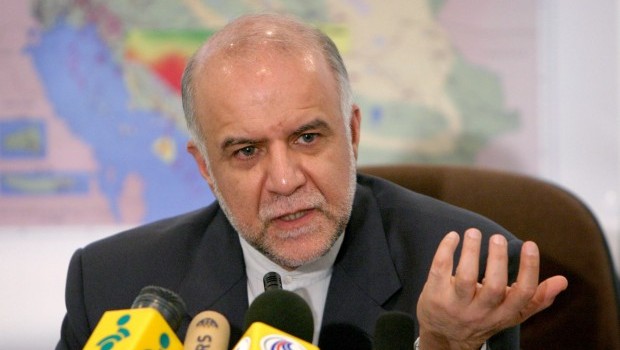
Iranian oil minister Bijan Zanganeh speaks during a news conference at the oil ministry in Tehran in this March 8, 2005, file photo. (REUTERS/Raheb Homavandi/Files)
London, Asharq Al-Awsat—Iran’s oil minister said on Monday that his country will increase its crude oil output despite the US-led sanctions against the country’s energy sector.
Iran has an “extensive plan” to bolster its oil production capacity, Bijan Namdar Zanganeh said in an interview in Tehran with SHANA, the ministry’s own news agency, despite extensive US-led sanctions on Iranian petrochemical exports.
“Iran will use all facilities to increase the level of its oil exports and will not wait for US permission,” he said.
Iran is also planning to increase its gas production, according to the minister. Iran has the second-largest proven gas reserves in the world, in addition to the fourth-largest proven oil reserves.
On Sunday, Zanganeh said the production capacity of Iran’s giant South Pars gas field in the Gulf would increase by 100 million cubic meters per day in the current Iranian calendar year, which started on March 21, 2014.
According to a recent report by the International Energy Agency (IEA), Iran’s crude oil exports, including condensates, reached 1.41 million barrels per day (bpd) in January and February this year, the highest level since January 2013.
Iran’s biggest crude export markets—China, India, South Korea and Japan—have increased their purchases slowly but steadily during the first few months of 2014.
The increase followed an interim nuclear deal signed between Iran and the P5+1 on November 24 last year, which went into effect in January.
Under the deal, the world powers negotiating with Iran agreed to ease some of the existing sanctions against Iran in exchange for the country agreeing to limit certain aspects of its nuclear activities during a six-month period.
The deal allows Iran to export 1 million bpd a day to Turkey, South Korea, China, India, Japan and Taiwan.
It is unclear what the destination of the new exports hailed by Zageneh will be.
Russian business newspaper Kommersant reported this week that Russia was preparing to begin importing 500,000 bpd from Iran as part of a barter deal, though this could result in additional US sanctions, which in turn could cause the nuclear deal struck in Geneva to unravel.
At the beginning of 2012, the US and the European Union imposed new sanctions on Iran’s oil and financial sectors over its nuclear energy program, in a bid to prevent other countries from purchasing Iranian oil and conducting transactions with the Central Bank of Iran.
